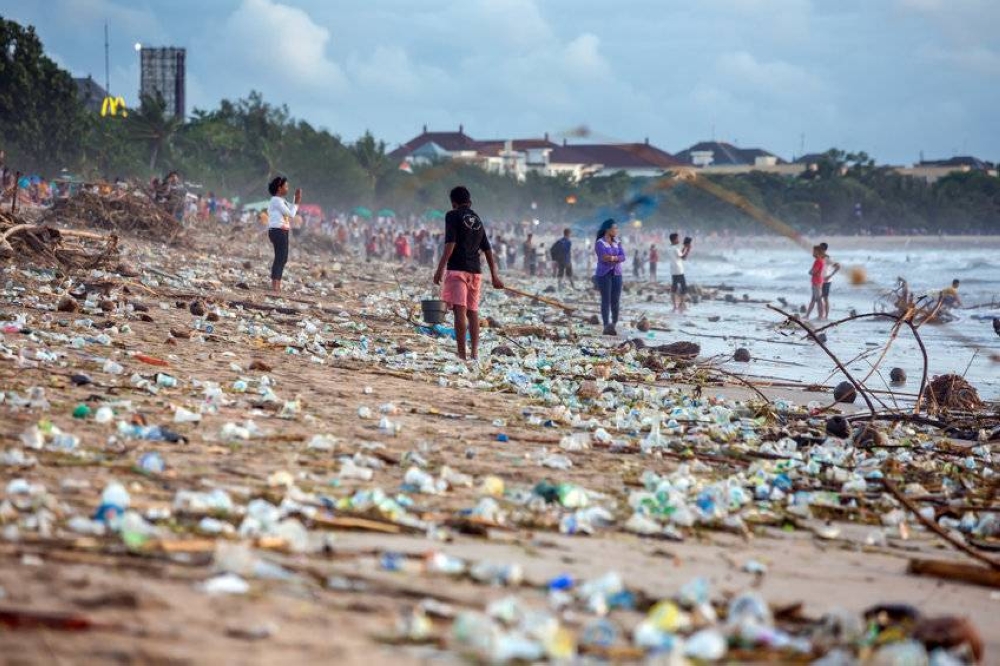Plastic pollution drastically endangering marine life, contaminates human food chain
NURHIDAYAH HAIROM MUHAMMAD YUSAINY MOHAMAD YUNUS
SHAH ALAM - Marine life and sea salt are becoming among the most contaminated food source stemming from plastic waste ending up in the sea.
Plastic pollution in the marine ecosystem and its food source will subsequently give a huge impact on human health as we are depending on seafood as a large part of our food chain.
Plastic pollution is even linked to contributing to chronic diseases among humans such as endocrine disorders and cancer, among others.
Environment lecturer at Universiti Putra Malaysia Professor Dr Haliza Abdul Rahman said Malaysians are not exempted from facing these health risks as we failed to manage plastic waste that has led to ocean plastic pollution.
According to Haliza, Malaysians used nine billion plastics a year, a large part of which, ends up in the ocean.
“Research suggest that the country produce 0.94 million tonnes of mismanaged plastic waste and 0.14 to 0.37 million tonnes of plastic may have ended up in the sea.
“If plastic waste is not managed well, it will create an island of plastic waste in the middle of the ocean due to rainwater (carrying the plastic waste) through rivers and ending up in the ocean,’’ she said to Sinar Harian.
She explained further that plastic floating in the sea absorbed dangerous and toxic pollutants such as polychlorinated biphenyls (PCBs), chlorinated pesticides (DDT) and polycyclic aromatic hydrocarbons (PAH).
Haliza stressed that the sustainability of marine life and human health will be endangered when marine food sources are polluted by microplastic and nano plastic waste.
“Small plastic particles that lasted in the sea for decades not only threaten marine life but also pollute the entire marine ecosystem,’’ she said.
For Turtle Conservation Society of Malaysia (TCS) project Manager, Dylan Wang said marine life such as turtles usually eats plastic waste as they often confuse the material for food.
“When they eat plastic waste, it is hard for their stomach to digest the plastics, so they do not get nutrition from the right food.
“I have even collected turtle eggs enveloped with plastic waste. Because if they (the turtles) took their time to lay eggs, we would go and take a look and find plastic at where they lay eggs, so we have to pull the plastic out,’’ he said to Sinar Harian.
Commenting further, Dylan said the continuous plastic waste problem in the country is now a global issue that can lead to the extinction of certain marine life.
“I once buried a Baning tortoise ( Asian forest tortoise) and after three months, I dug it up again to get the bones and its shell.
“In its shell, despite the organs being completely gone, the plastic waste remain,’’ he said.
Haliza also stated that some 663 species of aquatic animals, including turtles, are reported to face negative effects from plastic pollution.
“All levels of sea life is at risk. From planktons to larger animals such as seagulls, seals, turtles, dolphins and whales.
“As many as 100 million marine mammals are killed each year due to plastic pollution as they thought it was a food source,’’ she said.
“The report on whales dying from plastics are not uncommon either,’’ she added.
Dylan also stated that the non-governmental organisation is ready to work with the government to help increase awareness among the masses on keeping the oceans clean thus saving marine life in the process.
“The government plays an important role in ensuring plastics usage in hypermarkets, food stalls are reduced.
“Society has used plastic for decades so to ask them to change their habits, is hard.
“So we need to conduct awareness campaign in each school so that they can even influence their parents,’’ he said, adding that the youth also plays a huge role in raising awareness on plastic pollution.
Weighing on the matter is also Sahabat Alam Malaysia (SAM) honorary secretary Mageswari Sangaralingam who stressed that plastic waste, which contains toxic chemicals, is a grave danger to both marine ecology and human lives.
Mageswari then urged the government to enact better control measures to reduce plastic usage and its production.
She also that the issue of plastic waste will be discussed at the Fifth Session of the United Nations Environment Assembly (UNEA 5.2) at the end of February, to work on a new global agreement to combat the matter.
“The new global agreement must eradicate the toxic effect of plastic throughout its life cycle, from their production, usage and disposal stage.
“It also has to provide a remedy to affected communities and reduce the toxic effects of plastic.
“Therefore we asked the government to support the Rwanda-Peru resolution for the upcoming negotiations for the global plastic treaty,’’ she said, referring to the UNEA 5.2.
Download Sinar Daily application.Click Here!














